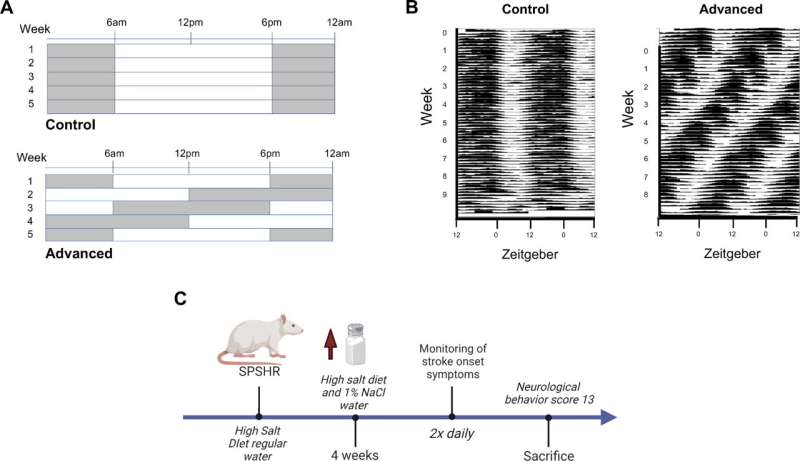This article has been reviewed according to Science X's editorial process and policies. Editors have highlighted the following attributes while ensuring the content's credibility:
fact-checked
trusted source
proofread
Disrupting the circadian clock speeds up stroke onset and shortens lifespan, finds study

Long-term circadian disruption in a rat model of high blood pressure accelerated stroke onset and shortened lifespan, according to researchers from Morehouse School of Medicine in Atlanta. Researchers also discovered the rhythmic nightly drop in blood pressure typical in healthy animals seemed to disappear in rats exposed to shifting light schedules. The study is published in the American Journal of Physiology-Heart and Circulatory Physiology.
In this study, researchers focused on the physiological consequences of misaligned circadian clocks on kidney function. It is well-known that the brain's central clock is synchronized with light exposure. When light input is altered by shift work (a rotating work schedule that includes working during overnight hours) and varying sleep and mealtimes, the central clock can become desynchronized.
This change can lead to negative health consequences over long periods of time. For example, most healthy people experience a 10%–15% drop in blood pressure at night. When blood pressure doesn't follow this rhythm, cardiovascular damage can occur.
Researchers studied rats prone to strokes using salt-induced hypertension to determine how long stroke could be delayed. They separated the animals into four groups and housed them in either fixed or disrupted lighting schedules. Because rats are nocturnal and wake up at night, they turned off the lights six hours earlier every week, causing the rats to experience a model like rotating shift work schedules.
Two groups were given access to food for five hours each day. The other two groups were given 24-hour access to food during the same clock time regardless of light conditions. The scientists used a combination of intermittent fasting with a high-salt diet to determine if restricted feeding affected how quickly a stroke occurred.
To the surprise of researchers, intermittent fasting offered significant protection against stroke in this animal model. In fact, it even delayed stroke onset during disruptive schedules. "These findings demonstrate that circadian rhythms and time of day are important to consider during medical research from translational to clinical," said Anne M. Ramsey, Ph.D., the study's first author.
More information: Anne M. Ramsey et al, Long-term circadian disruption shortens life span and dampens blood pressure diurnal rhythms in stroke-prone spontaneously hypertensive rats, American Journal of Physiology-Heart and Circulatory Physiology (2023). DOI: 10.1152/ajpheart.00055.2023





















